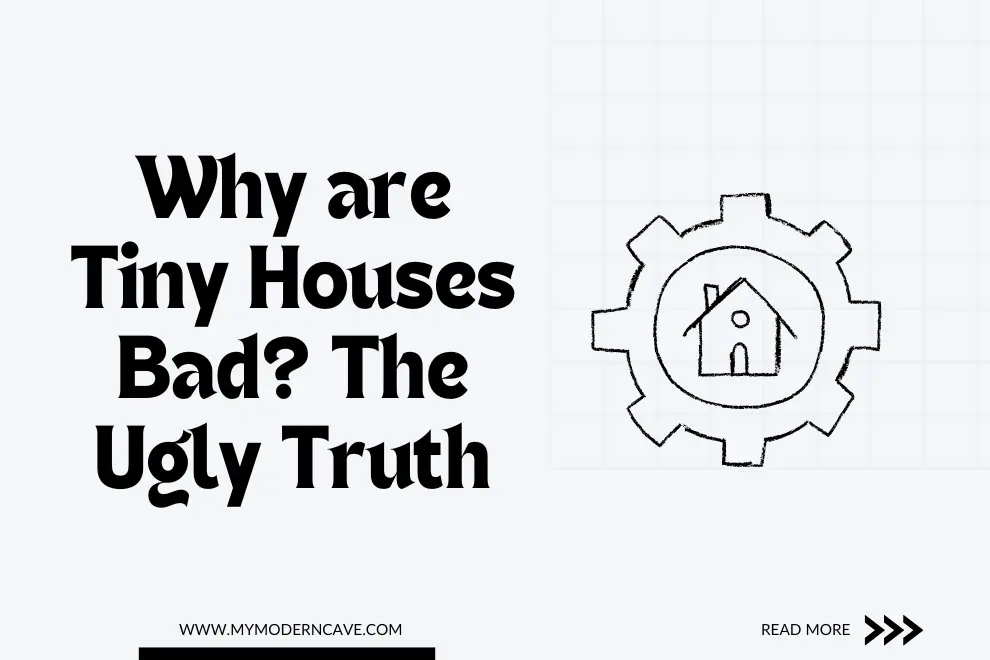Tiny houses have become a popular trend in recent years, with many people jumping on board with the idea of living a minimalist lifestyle in a small, mobile home. However, while tiny houses may seem like a good idea in theory, there are several reasons why they may not be the best choice for everyone.
In this blog post, we are gonna explore the downsides of tiny houses and explain why they may be a bad option for those considering this type of living arrangement.
Let’s dive into the topic.
Drawbacks of a Tiny House
Below are some drawbacks one may find while considering a tiny home.
Limited Space
One of the most obvious drawbacks of living in a tiny house is the limited space available. While some people may enjoy the challenge of living with less, others may find it difficult to adjust to the cramped quarters. There is often little room for personal belongings and even less space for guests. Besides, living in such proximity to others can make some people feel claustrophobic and uneasy.
Building Codes and Zoning Laws
Another major issue with tiny houses is difficulty obtaining building permits and complying with zoning laws. Many municipalities have strict regulations regarding the construction of homes, and tiny houses may not meet these standards. This can lead to legal issues and the possibility of facing fines or other penalties.
Lack of Amenities
Tiny houses also lack amenities that most people take for granted in a traditional home. For example, installing and maintaining utilities can be challenging, and there may be limited options for appliances and furniture. Plus, the close quarters can make it difficult to maintain privacy, which can be a problem for some individuals.
Here is a Video That Talks About the Struggles of a Tiny Houseowner:
Sustainability Concerns
While tiny houses are often touted as sustainable, they may not be as eco-friendly as many believe. Finding a suitable location for a tiny house can be difficult, and the lack of options for a green living can make it hard to live sustainably. Some critics argue that tiny houses can contribute to urban sprawl, hurting the environment.
Less Resale Value
While finding a suitable location to park or set up your tiny house can be challenging, the resale value of a tiny house may not be as high as that of a traditional home, making it a less attractive investment.
Conclusion
While living in a tiny house may appeal to some, it is essential to consider the downsides before deciding. Limited space, building codes, zoning laws, lack of amenities, sustainability concerns, and high costs are all critical factors. While some people may be able to do some housework for themselves, it is not necessarily the best choice for everyone.
However, it is worth noting that tiny houses are not always a bad option. For some people, the benefits of a minimalist lifestyle and the potential for greater freedom and flexibility may outweigh the drawbacks. It is essential to weigh the pros and cons carefully and make an informed decision that best suits your needs and preferences.
Key Takeaways
- Tiny houses can be a bad option for some people due to limited space, building codes, zoning laws, lack of amenities, sustainability concerns, and high costs.
- However, for those who value minimalism, mobility, and sustainability, tiny houses can offer reduced living expenses, greater freedom and flexibility, and a smaller environmental footprint.
- It is essential to weigh the pros and cons carefully and make an informed decision that best suits your needs and preferences.
Frequently Asked Questions
Are tiny houses always bad?
No, tiny houses are not always bad. While they may not be the best option for everyone, they can be a good choice for those who value minimalism, mobility, and sustainability.
Can I legally live in a tiny house on my property?
The legality of living in a tiny house on your property varies depending on where you live. It is important to check local building codes and zoning laws before deciding.
How can I do a little housework for myself despite its drawbacks?
To do a little housework for you, it is essential to prioritize your needs and preferences. This may involve downsizing and decluttering, finding creative storage solutions, and choosing a location that meets your needs. Not to mention that it is essential to be realistic about living in a tiny house and have a plan for addressing these challenges.
What are some benefits of living in a tiny house?
Some benefits of living in a tiny house include reduced living expenses, greater mobility, and a smaller environmental footprint. Living in a tiny house can also encourage a simpler and more intentional lifestyle.
What are some alternative housing options to consider?
Some alternative housing options include apartments, RVs, and tiny houses. It is essential to consider your needs and preferences when choosing a living arrangement.
How can I finance a tiny house?
Financing a tiny house can be challenging due to its unique nature and lack of widespread acceptance. Options include personal loans, RV loans, and specialized small house financing companies. Shopping around and comparing rates and terms is essential to find the best option for you.
